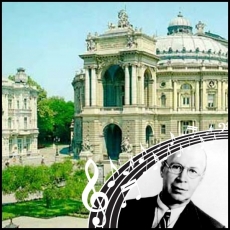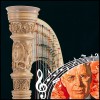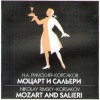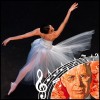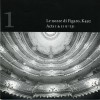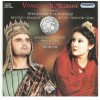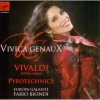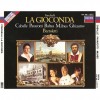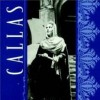歌剧剧本
Opera in two parts (an Epigraph and thirteen scenes), sometimes arranged as five acts, by Sergei Prokofiev to a Russian libretto by the composer and Mira Mendelson, based on the novel War and Peace by Leo Tolstoy. Although Tolstoy's work is classified as a novel, the 1812 invasion of Russia by the French was based on real-life events, and some real-life people appear as characters in both the novel and the opera, e.g. Prince Mikhail Kutuzov and Napoleon Bonaparte.
Part 1 (Peace)
The Overture or the Epigraph usually precedes the action
Scene 1: After dark, in the garden of Count Rostov's country estate, May, 1806
Andrei, who is a guest there, is depressed by the loss of his wife. Natasha, who also cannot sleep, looks out of her window and tells Sonya how beautiful the garden looks in the moonlight, and Andrei recovers his spirits.
Scene 2: New Year's Eve, 1810
At a ball in St Petersburg attended by the Tsar, Pierre encourages Andrei, who is attracted to Natasha, to ask her to dance. Anatole, also attracted to her, asks Hélène to arrange an introduction.
Scene 3: Town house of Prince Nikolai, February 1812
Count Rostov and Natasha visit Prince Nikolai's home. He is the father of Andrei, to whom she is engaged. Andrei has been abroad for a year. Princess Marya indicates that her father will not see them, and Count Rostov departs. However, the Prince, dressed eccentrically and behaving boorishly, does appear, and Natasha realises that he does not approve of the marriage.
Scene 4: Pierre's Moscow house, May 1812
Hélène tells Natasha that Anatole is attracted to her, and, after some hesitation, Natasha hears his declaration of love and agrees to meet him.
Scene 5: Dolokhov's apartment, 12 June 1812
Dolokhov has made the arrangements for his friend Anatole's elopement with Natasha. The coach-driver Balaga, Dolokhov and Anatole drink to the escapade and to the latter's mistress Matriosha.
Scene 6: Later that night
Natasha discovers that Sonya has given away her secret to Madame Akhrosimova, with whom they are staying. Anatole and Dolokhov are sent away by Gavrila, and Akhrosimova reduces Natasha to tears. Pierre arrives, reveals that Anatole is married, and agrees to ask Andrei to forgive Natasha. He shyly admits that he himself would want to marry her if he were free. Natasha makes her peace with Sonya.
Scene 7: Later still
Hélène is entertaining Anatole, Metivier and an Abbé. Pierre, returning home, upbraids Anatole and demands that he leave Moscow immediately. He agrees, and Pierre is left alone to bemoan his own circumstances. Denisov arrives with the news that Napoleon and his army are crossing into Russia. War is inevitable.
Part 2 (War)
The Epigraph is usually performed here if it was not used at the start of Part 1.
Scene 8: Near Borodino, 25 August 1812
Amid preparations for the defence of Moscow, Andrei and Denisov discuss utilising partisans to make life difficult for Napoleon's army. Pierre, wanting to observe the scene, arrives, and he and Andrei embrace, perhaps for the last time. Field-Marshal Kutuzov offers Andrei a position on his staff, but Andrei prefers to go into battle with his own regiment. The battle starts.
Scene 9: Later that day
Napoleon ponders his position, first refusing to commit more men, then agreeing. An unexploded cannon-ball lands at his feet and he kicks it away.
Scene 10: Two days later
Kutuzov and his generals are holding a Council of War at Fili, near Smolensk. The army will be at risk if Moscow is to be defended to the last - but if the army retreats, Moscow will be at the mercy of the French. Kutuzov decides that only by retreating, and potentially sacrificing Moscow, will there be any hope of victory.
Scene 11: Moscow is burning
The city is on fire because its citizens try to avoid a surrender. Pierre is caught up among some Muscovites, including the veteran Platon Karataev, who are accused by the French of fire-raising. As the asylum and theatre burn, lunatics and actresses flee - but Napoleon has to admit that the courage of the people has frustrated his plans.
Scene 12: In a peasant's hut at Mitishi
The wounded Prince Andrei, delirious, has been evacuated with the Rostovs from Moscow. Natasha, who had been unaware that he was among her fellow evacuees, visits him. She tries to apologise for her conduct, but he again declares his love for her, and they sing of their happiness as Natasha reassures him that he will live. He falls asleep, and his heartbeat (conveyed by an offstage chorus) stops for ever.
Scene 13: November, 1812
On the road to Smolensk, the retreating French are escorting a group of prisoners through a snow-storm. Karataev cannot keep up and is shot, but Pierre and the others are rescued by the partisans. Denisov tells Pierre that Andrei is dead but that Natasha is alive and well. Kutuzov and his men rejoice in their victory, and celebrate the indomitable will of the Russian people.





